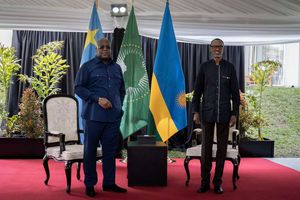Which way IEBC? Why split Kenya polls team is at a crossroads

What you need to know:
- Former IEBC commissioner Thomas Letangule agrees that the current circumstances are unprecedented. “The Constitution did not anticipate the situation the commission finds itself in. The law must be strengthened to address a situation when there is a split in the commission.”
Kenya's Independent Electoral and Boundaries Commission (IEBC) is in a tight corner as it hobbles to defend the anticipated presidential poll petition by Azimio la Umoja.
Elections have often exposed the IEBC’s soft underbelly. “The electoral management body morphs into something different after every election since 2002,” says National Coordinator of the Elections Observation Group (Elog) official Mulle Musau.
But unlike the past differences at the commission, the IEBC currently finds itself in a situation where one side will be opposing the petition by Azimio la Umoja One Kenya coalition party, while the other will likely support it, weakening its arguments at the Supreme Court.
“We are walking into uncharted waters in terms of jurisprudence. This is the first time in a presidential election petition where the commission as a corporate entity and its chairman are reading from different scripts,” Nairobi lawyer Kibe Mungai says. “If the entire IEBC, which has the mandate to conduct elections in the 290 constituencies, does not support this process, what choice will the court be left with?”
Former IEBC commissioner Thomas Letangule agrees that the current circumstances are unprecedented. “The Constitution did not anticipate the situation the commission finds itself in. The law must be strengthened to address a situation when there is a split in the commission.”
Following the 2007 vote that resulted in post-election violence, the then-Electoral Commission of Kenya was disbanded and in its place, the Interim Independent Electoral Commission was instituted.
By the time the country was going to the 2013 election, the Constitution that created the IEBC had been promulgated in 2010.
After the 2017 election, the divisions in the IEBC were characterised by a fight between commissioners and the secretariat.
Then-IEBC chief executive James Oswago, his deputy Wilson Shollei and other staff members lost in that boardroom battle and were dragged to court over procurement irregularities. Some of the cases are pending.
For the commissioners who were led by Issack Hassan, sustained pressure by the then-Coalition for Reforms and Democracy resulted in their being asked to quit. Their resignation paved the way for the appointment of the team that was led by Mr Wafula Chebukati. But like the others before them, this, too, experienced its shock. The implosion began after the Supreme Court nullified the 2017 presidential election.
William ruto declared President-elect
As the National Super Alliance exerted pressure on the IEBC to initiate reforms before the repeat election, and as the ruling Jubilee side placed its demands on the table, the commission’s house began to crumble.
Dr Roselyn Akombe, a commissioner, resigned before the presidential rerun in October 2017. Then Mr Chebukati’s war with IEBC chief executive Ezra Chiloba escalated, leading to the latter’s suspension in April 2018 before being eventually dismissed.
But as Mr Chiloba was being sent on suspension, three other commissioners – vice chairperson Consolata Maina, Paul Kurgat and Margaret Mwachanya – resigned, accusing Mr Chebukati of failing to provide leadership.
It is the script being repeated as current vice chairperson Juliana Cherera and commissioners Justus Nyang’aya, Irene Masit and Francis Wanderi level similar accusations against Mr Chebukati.
The difference this time, however, is that divisions are over the presidential vote. Since Monday when Mr Chebukati declared Deputy President William Ruto the president elect, it has been a free-for-all as the Cherera camp and the Chebukati group, which includes commissioners Abdi Guliye and Boya Molu, counter each other with public statements.
According to Mr Mungai, at the heart of the matter is that the two sets of commissioners were appointed at different times and probably, each side had different expectations.
“Different leaderships of IEBC have had their own difficulties. The issue with the current one is that after the nullification of the presidential election in 2017, there was an issue of whether the same IEBC, in this case, the three commissioners who remained after the resignations of their colleagues, should have been in charge of the 2022 election.”
The four commissioners who rejected the presidential election results announced by Mr Chebukati were appointed in September 2021 to replace the four who had resigned between 2017 and 2018.
Before the current open disagreements, there had been reports of the four being side-lined by the ‘old’ commissioners on several key decisions. For example, it took quite a while before the commissioners received their copies of the report of the audit of the voter register.
The ‘new’ commissioners also complained about being sidelined in the appointment of returning officers and there were reports that they were blindsided by the arrival of the first batch of ballot papers. Some of them learnt of the arrival just a few hours before the cargo landed in the country from Greece.
According to Mr Mungai, in terms of the technology used in the election, it also appears that not everybody had equal access based on the statement by the four commissioners, which Mr Chebukati has denied.
“As the gazetted National Returning Officer and in the spirit of teamwork, the chairperson involved all commissioners, including Juliana Cherera, Francis Wanderi, Justus Nyang’aya and Irene Masit in all activities of verification and tallying. Their duties were well defined in writing and allocated at the National Tally Centre. They had access to all results beforehand and interchangeably announced them for six days in the full glare of live television,” Mr Chebukati said in a statement released on August 17.
Yet, as the commissioners squabble among themselves, there is the question of which way for the IEBC.
“I think there is going to be a level of dysfunction in the commission,” says Mr Musau.
Immediately before them is the anticipated challenge of the presidential election result by Azimio. The coalition has until tomorrow to file its petition and will list IEBC and Mr Chebukati as respondents. The four commissioners have stated publicly that they cannot take ownership of the result announced by Mr Chebukati and reports suggest they could be planning to file affidavits in support of the petition. As such, a minority side of the commission will be defending the presidential election.
“The court must take them as one and if not, it would be interesting how the court interprets the division,” said Mr Musau.
In case the Supreme Court nullifies the results, the divided commission will be required to organise a fresh poll within 60 days amid the acrimony.
Moving forward, the IEBC also has to conduct elections for gubernatorial positions in Mombasa and Kakamega counties, member of National Assembly positions in Kitui Rural, Kacheliba, Pokot South and Rongai, as well as two MCA positions.
The challenge is how the commission will do this, bearing in mind that some of the four commissioners opposed to Mr Chebukati sit on or chair key committees of the commission such as ICT.
The Chebukati group of commissioners have just five months before their terms expire in January 2023, leaving Ms Cherera to run the commission as acting chairperson for some time until a substantive chairperson is appointed to succeed Mr Chebukati.





